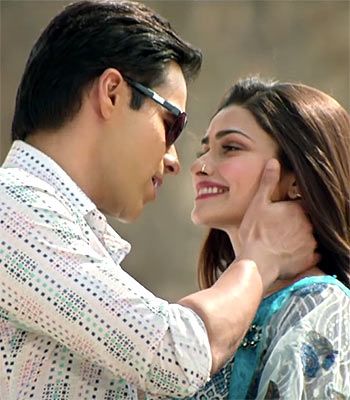 Emraan Hashmi and director Tony D'Souza try hard, and their effort shows. But Raja Sen wishes he could have said the boys played well.
Emraan Hashmi and director Tony D'Souza try hard, and their effort shows. But Raja Sen wishes he could have said the boys played well.
When news of the match-fixing scandal broke, my very first thought was for Mohammad Azharuddin's wrists.
The heartbreak was unbelievable, and echoes of that particular ache still remain. Believe the hyperbole.
Cricket was tantamount to religion back in the untainted day, and the idea that some of our heroes were thieves was a crushing one, one the sport never quite bounced back from.
It was at this point, before I pored over salacious transcripts of sting operations and read up a CBI report as if my graduation depended on it, that I wondered what would happen to those sublime wrists, wrists that carved poetry across the fields, and what handcuffs would do to them.
For, to naive teenaged me, it was unthinkable that Azhar not be jailed. Not merely banned and disgraced but imprisoned, for fraud and perjury and whatever they could throw at him, because what Azhar did was unforgivable.
As the transcripts came out and the probes went deeper, it became clear that Azhar, with those glorious wrists weighed down by designer watches, had fixed matches, had taken money, and had confessed to doing so in his own words, on tape and later in writing -- I remember reading a long, rambling fax he had handwritten and sent to then wife Sangeeta Bijlani.
It was sickening, and Azhar -- with a striking life that saw him go from rags to riches, captain to crud -- became a villain.
This is the kind of story that deserves a cinematic telling, one of the few sports biopics that genuinely deserves to be made. Except, as Tony D'Souza's new film hastens desperately to say at the start of the film called Azhar, this is 'not a biopic.'
The wordy disclaimer says something to the effect of the film being a work of entertainment based around facts about a person's life, which sounds to me like an excuse to mock someone.
Alas, there is no such irreverence -- or intelligence -- to be found in the storytelling here, and the predictable template the film follows is efficient, but dull.
The Bollywood biopic is an emerging genre that can already be labelled lazy, because of the way the films lean on flattery.
Forced to gain the subject's approval, the films end up glorifying the subject well beyond the truth. Greys are glossed over, achievements are amped up, and a deafening background score thuds through to highlight moments the audience already knows.
Despite all that, the story of Mohammad Azharuddin is a ripper.
How did he first want to play cricket?
Which batsmen did he look up to?
What made him start relying on his wrists?
When, indeed, did he realise their invincibility?
What made him fall for Salman Khan's ex-girlfriend?
How financially strapped was his family and how did money change their lives?
What was he like when shooting Pepsi commercials?
Where did the wristwatch fascination come from?
What did he think of emerging Sachin Tendulkar?
How did he feel when the scandal broke?
Who did he feel got away with it?
There is a lot to say even if a film wants to take Azhar's side.
Unfortunately, D'Souza and writer Rajat Arora avoid all of the aforementioned questions and choose instead to continually mire the narrative in obvious cliché. Even if the film starts off snappy enough, the contents are old hat.
A cricketer is told by his grandfather that he should play a hundred test matches, and grandpa -- who lies on his deathbed while, for some reason, clutching a cricket bat -- gives him Uncle Ben like advice that is played back over and over again, even two scenes later.
Meanwhile, the young boy just wants to play, but distractions keep popping up. Even though he doesn't want to have an extramarital affair, Poor Azza finds himself in one. Even though he doesn't want to sell India out to a bookie, Poor Azza ends up doing that.
Ridiculous as it is, this Poor Azza approach actually works for a fair chunk of the film's running time because of the sincerity Emraan Hashmi brings to the table. He isn't a great mimic -- that dopey Azhar head nod, the slumping shoulders, the microphone mutterings -- show up from time to time but remain inconsistent, but the actor is almost touchingly honest. Which is saying a lot considering he's made to spout so much malarkey his name might as well be Mohammad Aphorism.
He -- and Kunal Roy Kapoor, who plays a fumbling lawyer endearingly -- are the best things in this film, but the competition isn’t at all cutthroat.
Nargis Fakhri looks mad weird as a hysterically sobbing Bijlani, while Prachi Desai, as Azhar's first wife Naureen, is cloyingly saccharine and straight out of a television soap. (This film is a Balaji production, which explains a lot.)
The story is told, as I said, with more efficiency than we're used to, at least over the brisk first half. With the exception of unbelievably juvenile courtroom scenes, the film motors along.
There are even some fun scenes, either involving an amusing Gautam Gulati -- a swaggery Ravi Shastri caricature -- or Hashmi himself, manfully but awkwardly throwing one hand into his pocket with a commitment that would, more than Azhar himself, make Mohnish Bahl and Alanis Morissette proud.
There is one moment in the film that even gave me goosepimples, but, to be fair, the words 'Azhar takes a one-handed catch' would do that irrespective of visual or typeface. Man, what a fielder. (We don't see nearly enough of that in this film either. Would it have killed them to show us Azza alone on the field after dusk, practising hitting the stumps with those one-handed throws like only he could? Sigh. Such a wasted chance, this film.)
In the second half, as the facts become obscured and the storyline becomes contrived, the film becomes an utter drag. As Fakhri enters the film and the feeble songs increase in frequency, the film turns into something so lifeless you could call it Azerbaijan.
And then comes the death blow: With no apparent room for ambiguity, the film exonerates Poor Azhar not merely as Poor Azhar but -- stupifyingly -- as a man who took bribes from bookies in order to keep the rest of his team clean. Ugh. This is the bit that hurts most. This appalling justification is an unforgivably offensive conceit, and I'm furious just thinking about it now, as I type.
There is a scene involving Azhar's famously turned-up collar, where his wife tells him she likes it folded traditionally, like a gentleman, and she asks him to fix it. He thinks of Sangeeta who likes it raised, like a cocksure superstar, and reluctantly fixes it.
It's a fine idea and could have been a strong moment, except the collar didn't look too raised at the head of the scene, or too mellowed afterward. It looks the same and the scene plays out, like this film, entirely ineffectual.
As a work of fan-fiction, Azhar is a mostly watchable film with a solid lead, but falls far short of being either entertaining, insightful, or worthy of recommendation. Hashmi and D'Souza try hard, and their effort shows.
I just wish I could have said the boys played well.
Rediff Rating: 











 © 2025 Rediff.com -
© 2025 Rediff.com -